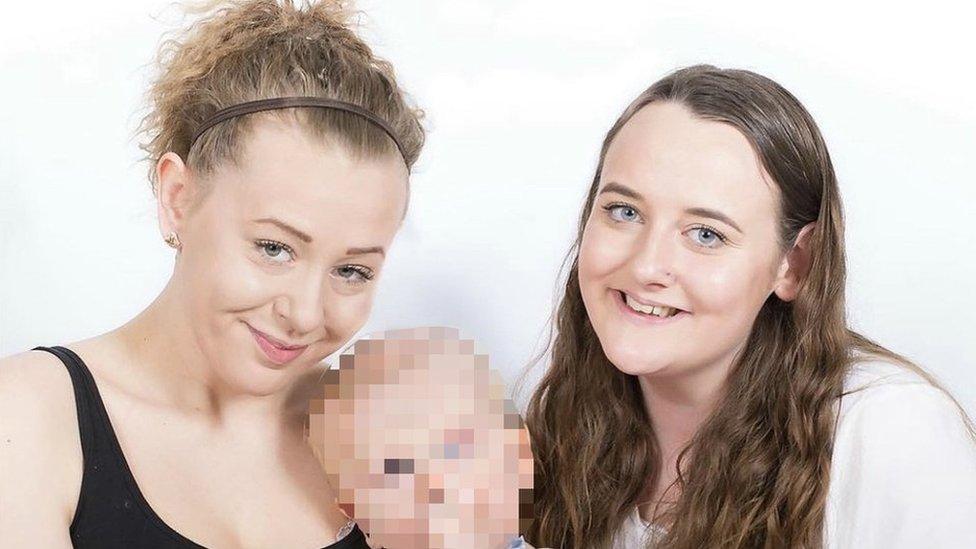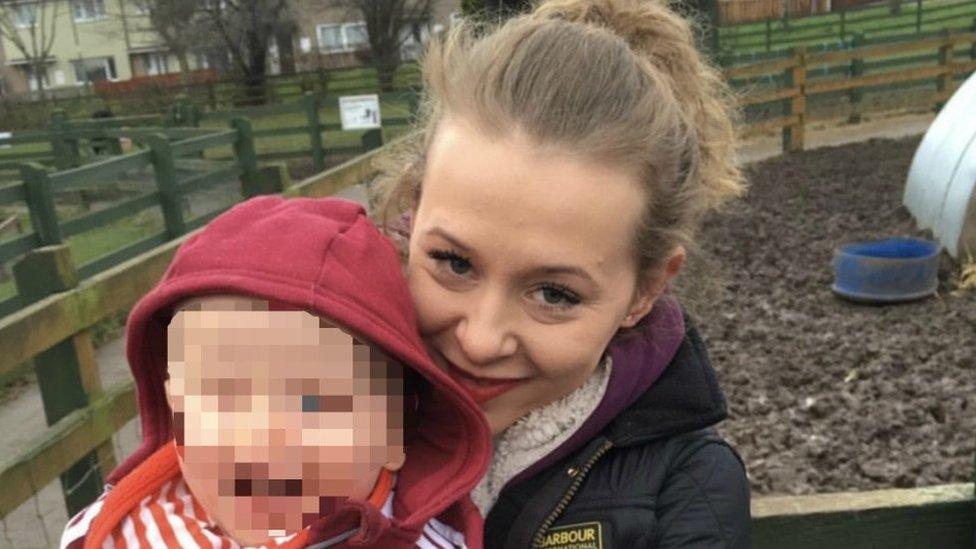Philippa Day: Benefit errors 'predominant factor' in mum's death
- Published
Philippa Day: Benefits problems 'destroyed Nottingham mum'
Authorities who dealt with a benefits claim from a single mother, who took a fatal overdose after her payments were cut, made 28 errors in managing her case, a coroner has found.
Philippa Day, 27, was found collapsed at her Nottingham home beside a letter rejecting her request for an at-home benefits assessment in August 2019.
She died after two months in a coma.
Nottingham Coroner's Court heard the way her claim was dealt with was the "predominant factor" in her overdose.
Recording a narrative conclusion, coroner Gordon Clow said he could not determine whether she intended to die rather than put her life at risk.
'Starving'
Miss Day, who had been diagnosed with unstable personality disorder, had been receiving disabled living allowance (DLA) payments as she had type 1 diabetes.
Those payments stopped in January 2019 after she made an application for a personal independence payment (PIP), reducing her income from £228 a week to £60.
This, the inquest heard, was because a form she had sent went missing and her payments were not reinstated for months, despite her eligibility.
This led to her taking out short-term loans and ending up in debt.
The court heard in June, she called the Department for Work and Pensions (DWP) to say she was "starving" and "couldn't survive like this for much longer".

Philippa Day (left) took a fatal overdose and died in October 2019
She was then asked to attend a face-to-face assessment despite it being "distressing" for her, Mr Clow said.
The coroner added Miss Day's mental health problems were "exacerbated" by the benefits process.
He accepted it had been "the last straw" for Miss Day who was already experiencing a range of stressors.
He said: "Were it not for this problem, it is not likely that she would have [overdosed] on the 7th or 8th of August."
Call handlers repeatedly failed to flag that the case required "additional support" due to her mental health problems, the coroner said.
The DWP did not tell her community psychiatric nurse that she had not returned the form before refusing her application, which could have resolved the issue.
The coroner said call handlers received little to no training on personality disorders like Miss Day's - all that was available was a factsheet.
Capita was made aware of the risks to Miss Day's health from a face-to-face interview by her community psychiatric nurse, but did not act on it, he added.
Mr Clow said: "Given the sheer number of problems in the handling of her claim, I am unable to conclude that each of these was attributable to individual human error."
He concluded the failure to administer her benefit claim in a way that avoided exacerbating her mental health problems was the "predominant factor" that caused Miss Day to overdose.
'Deeply tragic'
Mr Clow recommended changes at both the Department for Work and Pensions (DWP) and Capita, the authorities involved.
In a prevention of future deaths report, Mr Clow said the DWP should consider timely mental health training for call handlers and address "poor record keeping".
The DWP and Capita were also directed to review the change of assessment process so that it does not "create unnecessary distress".
A spokesman for the DWP said: "This is a deeply tragic case. Our sincere condolences are with Miss Day's family and we will carefully consider the coroner's findings."
A Capita spokesman said the company also apologised for the mistakes made.
"We have strengthened our processes over the last 18 months and are committed to continuously working to deliver a high-quality, empathetic service for every claimant," he said.
"In partnership with the DWP, we will act upon the coroner's findings and make further improvements to our processes."

Analysis: Michael Buchanan, social affairs correspondent
This conclusion amounts to a near dismantling of the process for applying for the main disability benefit for people with psychiatric problems.
While around 40% of claimants for personal independence payments have mental health conditions, the inquest found that call handlers for the DWP didn't receive adequate mental health training.
The coroner found there was an "institutional assumption" in the DWP that problems with a claim were the claimants' fault.
Last year a report from the National Audit Office (NAO) found the department had investigated 69 suicides of benefit claimants since 2014-15.
There were more cases they could have looked into, said the NAO, but in any case the department couldn't demonstrate any improvements from their investigations had actually been implemented.

Follow BBC East Midlands on Facebook, external, Twitter, external, or Instagram, external. Send your story ideas to eastmidsnews@bbc.co.uk.
Related topics
- Published12 January 2021

- Published6 November 2020
